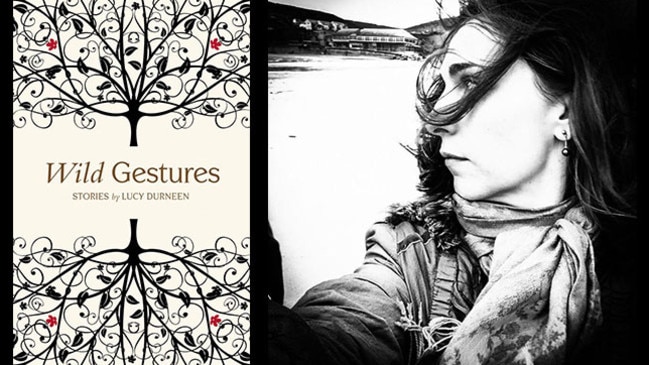Adelaide’s Midnight Sun snaps up Lucy Durneen’s Wild Gestures
Widely published English writer Lucy Durneen has placed her first book in unexpected hands.

I wrote a fortnight ago about small publishers, and this week I want to note a book from one, Adelaide-based MidnightSun, which started up in 2012. The book is Wild Gestures (215pp, $24.99), the debut short story collection by English writer Lucy Durneen. It’s impressive that Durneen, widely published in literary journals and nominated for awards such as the Bridport Prize, has chosen an independent Australian publisher for her first book. Her response on seeing it the first time, with its cover design by Kim Lock, was: “It’s so beautiful I need to lie down in a darkened room.”
Well, the need for such repose is something people may feel on reading Wild Gestures. There is darkness in the stories, but also humour. The recent book of which it reminds me is also by an English author, Claire-Louise Bennett’s Pond. The stories in both are fragmentary yet connected. The characters are elusive, as is what has happened to them. Durneen’s stories have a building tension that keeps the reader guessing, or perhaps thinking is the better word. The question is not whodunit?, but who is this person and what has she (or he) been through?
The opening story, Time is a river without banks, seems to be about a mother who has lost a child in terrible circumstances. She “was now reduced to a language of absence, which made no sense to the people who could still celebrate presence in conventional ways. It was not like a hole had opened up in the world … It was not like the world was any different; everyone still had somewhere to get to …” The ending is beautiful and a bit frightening.
Water flows through the stories in a secretive, seductive stream. In The old madness and the sea, there’s an explicit reference I like, partly because it’s just out of my understanding. Murray is gazing at the sky when “for no good reason he remembered lying on his back on hot white sand with a girl he’d once known who said that all things emerged from the sea only to spend their whole life longing to return to it”.
The stories are full of such curious moments that demand a sentence be read and reread. This is perhaps my favourite, also involving Murray, who it seems has been a soldier in Iraq: “ … it was almost like it had felt in the desert, when he’d wanted to be at home. Of course when he was home he wanted to be in the desert, a pressing, contradictory urgency which he imagined was how perhaps it felt to be a snake ready to shed.”
Durneen is due to visit Australia in October for the Australian Short Story Festival in Adelaide. I’ll finish with a bittersweet description, from It wasn’t Stockhausen’s, of the physical pleasure that comes with reading a well-used book: “… a funny restlessness starts to waken in him with each new page. He inhales the raft of smells that must come from the fingerprints that have touched this book, hundreds of them, perfumed, nicotine stained, antiseptic, all impressed on the paper. It’s good, maybe even a little addictive.” The reader is in hospital, not doing well.
That passage takes me to the quote of the week, because it involves a writer and a book I value, no matter how far he and it have fallen. “Even bad books can change lives.” That’s the opening sentence of Phil Baker’s Times Literary Supplement review of a new book about the “angry existentialist” British writer Colin Wilson. It’s a beautiful thought because no matter how bad a writer Wilson became or how badly his landmark 1956 book The Outsider came to be viewed, for me — and I’m sure many others who read it in their teens — it was the introduction to authors and books I have loved ever since. Reading The Outsider made me read, for example, The Outsider, published 15 years earlier, and while I’ve never read Wilson since, I have read a bit of Albert Camus, and I thank Wilson for planting the seed.




To join the conversation, please log in. Don't have an account? Register
Join the conversation, you are commenting as Logout